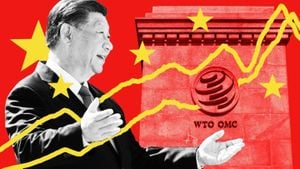At the COP29 climate summit held in Baku, Azerbaijan, global negotiations have spiraled as nations grapple with the contentious issue of climate finance. Developed countries, facing intense pressure, are under scrutiny for their unwillingness to commit substantial funding to help developing nations tackle climate change challenges. After lengthy discussions, the summit presidency released a draft proposal aimed at earmarking $250 billion annually for climate action by 2035, but it has generated substantial criticism from both developing and developed states.
The proposed draft finances have left many disappointed, particularly since the figure falls drastically short of the estimated $1.3 trillion required for developing countries to effectively transition to sustainable energy sources and cope with the detrimental impacts of climate change. Independent experts have called for at least $1 trillion annually to aid this transition. Juan Carlos Monterrey Gómez, Panama’s Special Representative for Climate Change, remarked, "The Arab Group will not accept any text targeting specific sectors, including fossil fuels." With over 1.5 billion people residing in developing nations, access to the necessary financial aid is increasingly urgent as climate-related disasters become more frequent.
Frustration over the vague nature of these financial commitments was voiced across the room. Negotiators pointed out how the draft proposal left out specific figures, labeling the placeholders as insufficient. Azerbaijan’s presidency had hoped to unite various parties under its newly released proposals, but, instead, they found themselves confronted with resistance to what was perceived as inadequate. The lack of clear financial commitment—a staggering oversight as nations continue to suffer from unprecedented climate disasters—has left many delegations feeling disrespected and ignored. “Developed countries must stop playing games with our lives and show us proper quantified financial proposals,” Gómez said.
Aside from the monetary commitments, there are broader discussions concerning fossil fuel reduction and adaptation strategies for vulnerable nations. While there is dialogue on slashing emissions, the drafts have yet to result in any resolute action. Many suggest this reflects poorly on previous agreements, including those reached at last year’s Dubai Summit. U.S. Climate Envoy John Podesta expressed concerns about the lack of focus on transitioning away from fossil fuels, describing the current text as unworkable, calling for more ambitious efforts to align with growing climate demands.
Although COP29's host efforts focused on uniting differing opinions, it is evident there's wide disagreement over both the objectives and the strategies proposed. Questions still loom over how nations will realistically mobilize the estimated $1.3 trillion annually needed. This sentiment resonates with many developing countries, represented by entities like the G77 and China group, who demand firm commitments from wealthier nations or risk being left behind. Adonia Ayebare, chair of the G77, reiterated, “We want specific funding commitments; we need clarity on how funds will be raised and distributed.”
Critics cited the additional complication of including domestic financial resources as part of the climate finance proposals, particularly against the backdrop of discussions guaranteeing and enhancing the integrity of international funding mechanisms established under the Paris Agreement. The proposed draft reportedly included options to count all financing sources—including domestic resources—toward climate financing goals, but this suggestion did not sit well with several nations who feared it might dilute accountability.
Days before the conference was set to close, frustration among negotiators heightened. There were statements made by representatives from various developing countries, emphasizing how unrealistic and damaging the proposals from developed nations can be. "This feels like negligence from the very countries most responsible for the climate crisis," remarked Diego Pacheco, spokesperson for the Like-Minded Developing Countries. Pacheco underscored the glaring disparity: the wealthiest nations, heavily contributing to carbon emissions, are now hesitating to shoulder their responsibilities toward those most affected.
Meanwhile, developed nations like the EU pushed back against proposals, claiming to seek every means possible to expand the contributor base. Climate Envoy Wopke Hoekstra voiced frustrations over the balance of commitments, claiming major proposals were imbalanced and did not adequately express the contributions from every involved party. The criticism extended beyond internal disagreements: even as developing nations demanded clear quantum figures and funding commitments, the United States stated concerns over the skewed nature of proposals lacking viable paths for financial mobilization.
Moving forward, COP29 faces the looming deadline for finalizing these agreements, and the world watches closely as negotiators attempt to reconcile the stark differences between wealthier and developing nations. Given the ambitious climate goals set by the Paris Agreement, many are left wondering whether intentions will translate to the actionable commitments necessary to steer the world toward more sustainable practices. “If there is no agreement, we’ll have another COP where little is achieved; this cannot be the legacy of this summit,” said Canadian Environment Minister Steven Guilbeault.
With pressure mounting, discussions are expected to ramp up as countries seek to finalise their positions before the conference conclusion. The urgency of addressing climate change through meaningful funding and commitments hangs heavily as COP29 attendees aim for the monumental task of bridging the existing divides and moving toward collective solutions. Whether Baku's summit yields solid arrangements for climate finance remains to be seen, but the drive to secure tangible results persists. The failure to establish credible commitments could echo the disappointments of previous summits and leave vulnerable countries to bear the brunt of climate consequences without the necessary support.



